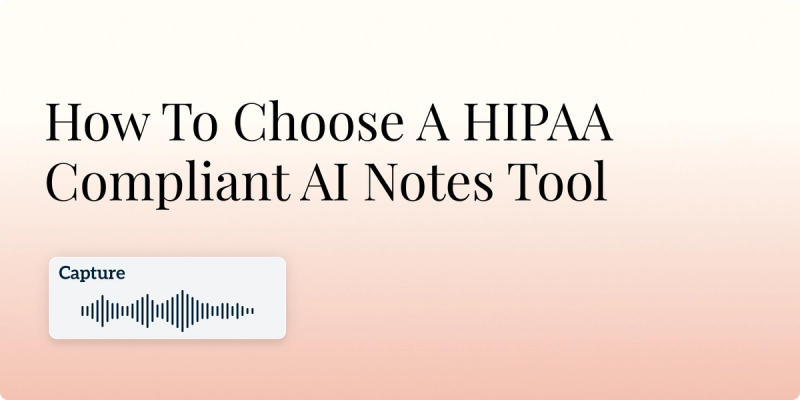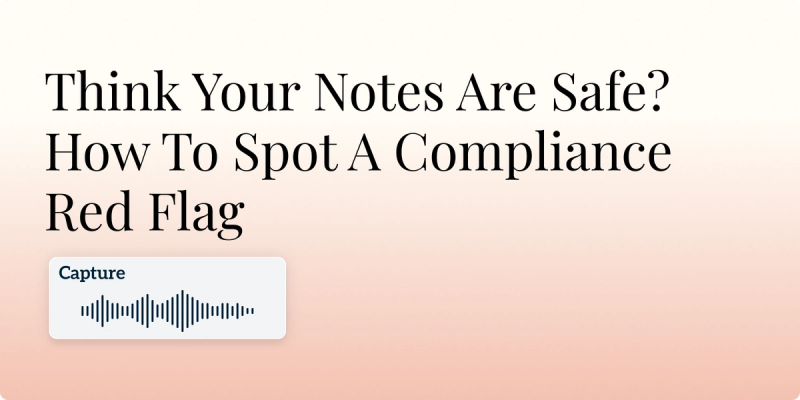
How To Choose A HIPAA Compliant AI Notes Tool

The promise of AI in healthcare is immense: to automate the burden of clinical documentation, reduce burnout, and draft progress notes in seconds. But for any covered entity, a hospital, a clinic, or a private therapy practice, this convenience cannot come at the cost of patient privacy and legal compliance.
The leap from a general‑purpose AI tool to a HIPAA‑compliant AI notes tool is a chasm, not a step. Using a non‑compliant tool is like discussing a patient's sensitive health information in a crowded public space. The risks of data breaches, regulatory fines, and loss of patient trust are simply too high.
This guide is designed to cut through the confusion. By diving into the technical and operational specifics you need to evaluate, ensuring the tool you choose protects your practice as effectively as it improves your workflow.
Why HIPAA Compliance Matters for AI Notes Tools
The Health Insurance Portability and Accountability Act (HIPAA) isn't just a set of guidelines; it's federal law. Its primary goal is to protect sensitive patient health information (Protected Health Information, or PHI) from being disclosed without the patient's consent or knowledge.
When you use an AI notes tool, you are feeding it the most intimate details of a patient's life: their substance use and financial information. This data is a goldmine for hackers and is incredibly vulnerable if not handled correctly.
A Non-Compliant Tool Can Lead To
- Data Breaches: Unencrypted data, insecure storage, and unauthorized access can lead to PHI being leaked or potentially sold on the dark web.
- Financial Penalties: The Office for Civil Rights (OCR) can levy fines ranging anywhere from $100 to $50,000 per violation, with annual maximums reaching millions of dollars.
- Reputational Ruin: Patients trust you with their data. A single breach can shatter that trust and destroy a practice built over decades.
- Legal Liability: You, the healthcare provider, are ultimately responsible for any mishandling of PHI by your business associates, including your AI vendor.
Choosing a HIPAA‑compliant AI notes tool is not a feature; it's the foundation of ethical and legal clinical practice in the digital age.
HIPAA Requirements for AI Documentation Tools
To ensure safe medical AI notes, an AI tool and its vendor must address the core rules of the legislation:
- The Privacy Rule: This sets the standards for who can access and receive PHI. When choosing a HIPAA AI Tool, this means it must have strict access controls, ensuring only authorized healthcare professionals can view the notes.
- The Security Rule: This is the technical heart of HIPAA for digital tools. It requires safeguards for electronic PHI (ePHI), broken into three categories:
- Administrative Safeguards: Security management processes, workforce training, and contingency plans.
- Technical Safeguards: The technology itself must protect data and control access. This includes encryption, access controls, audit controls, and integrity controls.
- Physical Safeguards: Controlling physical access to data centers and servers where the ePHI is being stored.
- The Breach Notification Rule: This mandates that patients and the Department of Health and Human Services be notified in the event of a PHI breach.
Your relationship with the AI vendor is governed by a Business Associate Agreement (BAA). A BAA is a legally binding contract that obligates the vendor to be HIPAA‑compliant and liable for any breaches they cause. If a vendor cannot or will not sign a BAA, you cannot legally use their tool with patient data.
How to Choose a HIPAA-Compliant AI Notes Tool
Selecting the best HIPAA‑compliant AI notes tool requires a meticulous, security‑first approach. Follow these steps to make an informed decision.
Step 1: Evaluate Security & Privacy Features in the AI Notes Tool
This is the non‑negotiable technical checklist. Dont just take their word for it; ask for specific details.
- Encryption Everywhere: ePHI must be encrypted both in transit and at rest.
- In Transit: Look for Transport Layer Security (TLS) 1.2 or higher. This is the same technology that secures your online banking, creating a secure tunnel between your device and their servers.
- At Rest: Data stored on their servers should be encrypted using strong, industry-standard algorithms like AES-256.
- Access Controls & Authentication
- Role-Based Access Control: The tool should allow you to define who can see what. A receptionist shouldn't have the same access as a prescribing physician.
- Multi-Factor Authentication: This is a critical security layer. Beyond a password, MFA requires a second form of verification (like a code from an app) to access the system, preventing unauthorized access from stolen credentials.
- Audit Logs: A compliant tool must keep detailed, time-stamped logs of who accessed what data and when. This is crucial for detecting and investigating potential security incidents.
- Data Processing & Storage: Where is the data processed and stored? For U.S healthcare providers, the servers must be located within the United States to ensure they fall under U.S jurisdiction, and security standards add significant legal and security complexity.
- Data Minimization & Retention: The tool should only collect and retain data necessary for its function. Ask the vendor about their data retention policies: “Can you automatically delete raw audio files after a certain period while keeping the finalized note?”
Step 2: Assess Usability & Clinical Fit of the HIPAA-Compliant AI Notes Tool
If the tool isn't usable, it won't be used–no matter how secure it is. It must fit seamlessly into your clinical workflow.
- Integration with Your EHR: Does the tool integrate with your existing Electronic Health Record System? A seamless integration that allows you to push finalized notes directly into the patient's chart is a massive time-saver vs. manual copy-pasting.
- Accuracy and Customization: How accurate are the generated notes? Can you create custom templates for different encounter types (e.g, intake sessions, follow-ups, DBT therapy sessions)? The AI should adapt to your specialty and note-taking style.
- The Editing Workflow: The best AI tools act as an assistant, not an automation. The note should be easily editable, allowing you to quickly review, correct, and sign off. A clunky editing interface negates all the time you saved.
- Specialty-Specific Functionality: A tool designed for a primary care physician might not work for a mental health professional. If your focus is mental health, you need a tool built for your unique needs, for example, AI notes for therapists.
Step 3: Vet the Vendor’s Track Record and Compliance Readiness
You're not just buying software; you're entering a partnership. You need to trust the vendor.
- The Business Associate Agreement (BAA): This is your litmus test. Ask upfront: “Do you sign a BAA?” A reputable vendor will have a standard BAA ready for you to review.
- Security Certifications: Look for independent, third-party validations of their security posture. Certifications like SOC Type 2 Type II demonstrate that the vendor's systems and processes have been rigorously audited and found to be secure.
- Transparency: Are they transparent about their subprocessors? If they use a cloud provider like Amazon Web Services (AWS) or Google Cloud Platform (GCP), they should disclose this. These providers have robust security infrastructures built for healthcare.
- Customer Support & Training: Do they offer dedicated support and training on using the tool securely? A good vendor will help you onboard your team properly.
Step 4: Understand Pricing Models and Scalability Needs
Cost is always a factor, but view it through the lens of value and long‑term needs.
- Pricing Structure: Is it a per-user, per-month subscription? Per-session fee? Understand the total cost of ownership and ensure there are no hidden fees for data storage or support.
- Scalability: Will this tool grow with your practice? If you plan to add more clinicians or locations, ensure the pricing model remains feasible and the technical performance doesn't degrade.
Key Features to Look For in a HIPAA-Compliant AI Notes Tool: Checklist
Print this out and use it to score your potential vendors:
1. Security & Compliance
- Willingness to sign a Business Associate Agreement (BAA).
- End-to-end encryption (TLS 1.2 in transit, AES-256 at rest).
- Multi-factor Authentication (MFA) for all users.Detailed, immutable audit logs.
- Data processed and stored in the U.S.
- Clear Data retention and deletion policies.
- SOC 2 Type II or similar certification.
2. Usability & Workflow
- Accurate transcription and note generation.
- Easy-to-use editing and correction interface.
- Customizable note templates.
- Seamless EHR integration.
- Designed for your specific clinical specialty.
3. Vendor Reputation
- Transparent about security practices and subprocessors.
- Proven track record in other healthcare organizations.
- Responsive and knowledgeable customer support.
Comparing Popular HIPAA-Compliant AI Notes Tools
It is useful to know that the market includes everything from large, established EHR integrations to nimble, specialized startups; however, when you look at reviews for the best HIPAA-compliant notes tools, pay close attention to how they stack up against the checklist provided above. Key differentiators often lie in the quality of the AI, the depth of EHR integration, and the flexibility of the pricing model.
The following table provides a comparison of several popular options to help you begin your evaluation:
Tool | Pricing | Best For | Key Differentiators & HIPAA Relevant Notes |
|---|---|---|---|
Twofold | $49 | Fast, user-friendly clinical notes across specialties | Instant BAA sign, Audio deleted after processing, Focus on EHR workflow integration. |
Freed.ai | $99 | Good for high-volume providers and multi-specialty practices. | EHR push option for browser-based EHRs, unlimited note generation |
Upheal | $19 | All-in-one platform for tele-health-based therapists | Sessions are not used to train AI. Clients can control their data. |
Mentalyc | $59.99 | Therapists seeking insight-rich notes | Anonymizes transcripts; records are deleted after processing. |
Athelas | $150 | High-volume practices | ICD/CPT suggestions are built into the note, and multi-speaker recognition for conversations that are extended. |
How Twofold Simplifies HIPAA Compliance in AI Note-Taking
Twofold integrates HIPAA compliance directly into its technical architecture and operational protocols, addressing key physician concerns around data security and legal liability:
- Legally Binding BAAs: A Business Associate Agreement is executed upon account setup. This establishes a clear chain of trust and contractual obligation.
- Encryption on Certified Infrastructure: All data is encrypted in transit and at rest, using industry-standard protocols. The platform is built on HIPAA-eligible infrastructure within Microsoft Azure, ensuring physical and network security.
- Data Minimization: The system is designed to process audio for note generation without retaining the source recordings. Audio is transient, significantly reducing the data footprint.
Conclusion
Choosing a HIPAA AI tool is one of the most significant technology decisions a modern healthcare practice can make. By prioritizing a signed BAA, demanding technical proof of security, and ensuring the tool fits your clinical workflow, you can harness the power of AI responsibly.
The right tool does more than just save time; it enhances the quality of your documentation, reduces administrative fatigue, and most importantly, safeguards the trust your patients place in you.
Frequently Asked Questions
ABOUT THE AUTHOR
Dr. Danni Steimberg
Licensed Medical Doctor
Reduce burnout,
improve patient care.
Join thousands of clinicians already using AI to become more efficient.

The State Of AI Notes In Therapy
Explore the current landscape of AI therapy notes: their capabilities, limitations, and the ethical considerations for modern practitioners.

How To Keep Your Notes Personal–Even When Using AI
Using an AI scribe doesn't mean generic notes. Learn practical strategies to ensure your notes retain your unique clinical voice and style.

Think Your Notes Are Safe? How To Spot A Compliance Red Flag
Is your AI scribe putting patient data at risk? Learn how to spot critical HIPAA compliance red flags in your documentation before it's too late.

